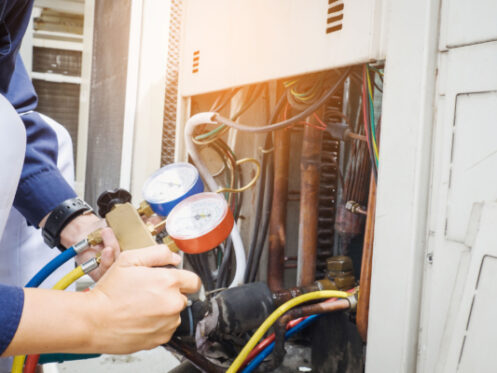A strange sound from your air conditioner is typically not a good sign. These noises could indicate a problem preventing your system from operating as efficiently as it should. Ignoring whatever is making these odd noises could cause significant damage to your air conditioner. Find out what’s making your air conditioner so noisy and why you need to get it looked at. Here is a list of some of the typical causes of an AC that is too loud.
Rattling Noise: Loose Parts or Debris
Many parts that make up your air conditioner can occasionally become loose. When that occurs, you will frequently hear a rattling sound. The sound can get worse if the piece actually separates. Fan blades, cover plates, and screws are examples of parts that can come loose. If you hear a sudden loud banging or rattling noise, it’s usually best to turn the system off immediately and call for repairs.
If your unit has not been cleaned or you haven’t had a maintenance inspection in a year, the rattling or banging may be the result of outside dirt seeping inside. Your unit may ratchet or bang if the condenser becomes clogged with debris, such as leaves, twigs, or dirt flakes. If you require assistance, it is wise to contact a licensed HVAC professional.
Screeching Noise: A Problem With the Compressor or Blower Motor
There may be a problem with your AC compressor if you hear a screeching sound from outside. Your compressor is responsible for moving the liquid refrigerant throughout your air conditioning system. It is an essential component of your system. If your air conditioner is older, it may be time for a replacement. A compressor’s life span is typically ten years.
You most likely have a problem with your air conditioner’s blower motor if the screeching sound comes from inside your house. Cool air is distributed throughout your home via a blower motor. Due to frequent use, this component usually wears out sooner than others.
Get a licensed AC expert to examine the system if you hear a screaming noise. They’ll be able to identify the problem and determine if you need a repair or replacement.
Dripping Sound: High Level of Condensation or AC Coils Freezing
If you hear an unusual dripping sound coming from your air conditioner, you might have a problem. Moisture from condensation is a normal part of AC operation. This moisture is handled by a pump or a drip pan with a condensate drain line.
But you should pay attention if these dripping sounds change location, duration, or become louder. Sometimes, the drain line can get clogged, which can cause the pan to overflow. This will make a different sound than usual.
You can also get more dripping if the coils have frozen. You will hear excessive dripping sounds when the ice on the frozen coil melts. The coils could freeze due to various issues, including clogged air filters and malfunctioning thermostats. In any of these cased, your AC should be checked by a professional.
Clicking Noise: Electrical Signal Failure or a Faulty Thermostat
It is perfectly normal to hear a quick clicking sound when the air conditioner starts and stops. A warning flag is when a clicking sound keeps coming during the cooling cycle. The clicking sound could be an electrical issue with a relay switch or capacitors in the compressor or the from a malfunctioning thermostat that must be replaced.
With the number of electrical components in these systems, electrical problems with air conditioners can be challenging to locate. An expert should be called to assess and fix any electrical issues. An expert can determine the cause of the problem and identify the solution. If the thermostat is bad, it’s a perfect time to upgrade to a smart thermostat. Your expert will ensure that it is appropriately installed and communicates well with the air conditioner in your house.
Buzzing Noise: Obstructed Copper Lines, Faulty Capacitor, and Contactor Malfunction
There are many potential causes of a loud buzzing sound emanating from your outdoor air conditioning equipment. A buzzing sound may come from copper lines attached to your air conditioner that are blocked or touching one another. To lessen metal-to-metal contact, make sure your pipes are insulated or cushioned.
Your AC system’s capacitor stores the energy needed to run your outside unit. The unit will buzz if the capacitor fails since it won’t have enough energy to keep the fan from going. Contact a licensed HVAC expert who can examine your system thoroughly and determine whether a capacitor can be repaired or has to be replaced.
Your air conditioner’s contactor regulates how much power gets sent to the compressor. You may hear a humming sound from the damaged part as the contactor deteriorates. When it malfunctions, it will prohibit the device from turning on.
High-Pitched Squealing Noise: Refrigerant Leak
A hissing or squealing sound might be from a refrigerant leak. To avoid mishaps, turn off your air conditioner immediately and unplug the device. While not typically fatal, breathing in refrigerant can cause a host of health problems, including headaches, dizziness, and respiratory problems. You should have a qualified HVAC expert check your air conditioner for any potential leaks. During this period, avoid using the air conditioner.
Whistling Noise: Restricted Airflow
The most frequent cause of a high-pitched whistling sound emanating from your air conditioner is from some type of restricted airflow. When airflow is blocked, such as from a clogged air filter, the pressure in the system can cause whistling sounds. The constraints on inflow airflow are typically the central issue.
The airflow from the air handler will also be constrained if insufficient air is drawn into the air conditioner. When this occurs, the air conditioner’s internal pressure rises. It whistles because the high-pressure air travels faster than it would otherwise. Your air conditioner’s high-pitched noise is caused by swirling air subjected to tremendous pressure.
Bubbling AC Noise: Excess Moisture in Your AC
As mentioned earlier, moisture is a necessary by-product of an AC system. However, excessive moisture could cause a bubbling noise. This noise can occur when your drainage pipe is blocked, cracked, or has a hole. Fixing this will require specialized tools, equipment, abilities, and training to resolve the bubbling noise coming from your air conditioner. Call a trained professional to guarantee the job is completed appropriately and safely.
Call Us for AC Repairs in Playa Vista and LA County
At Belle Air Services, we offer trustworthy air conditioning repair, replacement, installation, and general maintenance services for Playa Vista, CA, and LA County homes. We also provide various HVAC services, such as ductless mini-split installation, heating installation and repair, and indoor air quality services. We go above and beyond to ensure that every air conditioning service is done correctly. Your family’s comfort is always our top priority. Contact our team today if you notice any unusual sound coming from your air conditioner.





